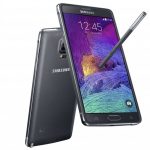Apple only manages to sell 10 million iPhone 6 and 6 Plus in opening weekend

Expectations always run high when it comes to sales of new iPhones during launch weekend. There's an incredible frenzy in the media fueled by loyalists, long lines form outside Apple stores (immediately followed by the first inadvertent drop caught on camera), the reviews are raving across the board (and why wouldn't they be when only loyalists get review units?) and, finally, on Monday, Apple gives its fans the much-awaited reason to celebrate -- a new first-weekend sales record.
Needless to say, the 10 million iPhone 6 and iPhone 6 Plus units that Apple managed to sell during the first weekend exceed the 9 million iPhone 5s and iPhone 5c units sold a year ago. Barely. Considering the appeal that larger iPhones seem to have -- we've been waiting for them for a couple of years, after all -- 10 million sounds a tad short. It really does.
T-Mobile reveals Samsung Galaxy Note 4's US availability and price

When it announced Galaxy Note 4 in early-September, Samsung revealed everything we wanted to know about its new phablet, except the date of availability and price. The two missing pieces of information would tell prospective buyers when to prepare for its arrival and how much they should expect to shell out for it, and help paint the full picture about how Galaxy Note 4 stacks up against its biggest rival, Apple's new iPhone 6 Plus, which goes on sale tomorrow.
Those who were hoping to find out what Samsung left out weeks ago are in luck, as US mobile operator T-Mobile has announced when Galaxy Note 4 will officially hit its store shelves, and, just as importantly, also at what price.
On Sept. 9th, Apple's Tim Cook era begins

I must disagree with colleague Mark Wilson, who last week asserted: "There is no reason for anyone to care about the iPhone 6", which as I write has 124 comments. I'm a big fan of provocative posts, because they engage the readership. But my feelings differ about commentaries that bluster without substance. Mark is absolutely wrong. There is every reason for everyone to care about the next iPhone.
Mark asserts that iPhone "used to be aspirational and high-end. Now the world and his dog has an Apple handset and it's turned from something special into a poor substitute for one of the countless alternatives...The iPhone is run-of-the-mill. It is predictable. It's just plain boring". In many ways, I agree, but his boring assessment is every reason to "care about the iPhone 6".
Forget PCs and tablets -- phablets are the next big thing

Phablets are emerging as the next big thing in the smart device market. According to research firm IDC, big-screen smartphones will out-ship portable PCs (laptops) before the end of 2014, and tablets sometime in 2015. What's more, also this year, phablet shipments are expected to far outnumber desktop PCs. Want to bet on a winning large form factor? Pick phablets.
In 2014, IDC expects shipments of phablets, tablets, portable PCs and desktop PCs to reach 174.9 million, 233.1 million, 170 million and 133.5 million, respectively. Fast forward to the end of 2015, and shipments of phablets and tablets reach 318 million and 233 million units, respectively. And with Apple expected to unveil an iPhone phablet, big smartphones are only going to make things worse for PC and tablet shipments.
Meet Samsung Galaxy Note 4 and Note Edge

Samsung is single-handedly responsible for creating the phablet category three years ago with the original Galaxy Note. Back then, big smartphones were believed to be nothing more than a niche, with no chance of ever enjoying mainstream approval. At first, I was actually one of the non-believers. But, as every Galaxy Note iteration has proved time and time again, consumers are actually quite fond of the idea of touching a big screen day in and day out.
But, the phablet market has changed dramatically since the original Galaxy Note was released, with more and more Android vendors competing for a slice of the pie. Heck, even Nokia got in on the action, representing Windows Phone, late last year with Lumia 1520 and Lumia 1320. Despite the increased competition, Samsung continues to be viewed as the pack leader, thanks in no small part to the dedicated features its flagship phablets pack. So, what does this year's Galaxy Note has in store?
Would you use a tablet to make a phone call?

Phablets -- super-sized phones -- serve a useful purpose. They allow consumers to carry just the one device that can be used as a smartphone and act as a tablet. However, while phablets are growing in popularity worldwide, in Asia tablets with cellular voice capabilities are gaining traction.
According to IDC’s Worldwide Quarterly Tablet Tracker, in Q2 2014 nearly 25 percent (around 3.5 million units) of all the tablets shipped in the Asia/Pacific excluding Japan (APeJ) region had cellular voice capabilities, allowing users to make calls by holding a tablet up to their faces. And we’re talking devices with screen sizes of 7 inches and up.
Emerging markets say 'bigger is better' when it comes to smartphones

A new report from market research firm Jana has revealed that emerging markets prefer smartphones with a larger screen -- that is, "phablets".
Out of 1,386 smartphone users, over 50 percent of users expected their next phone to have a screen that's at least 5in or larger. The reason for the popularity of a large screen is that for many users in emerging markets the smartphone is their only portal to the Internet.
Apple isn't Phabulous

Goldilocks knocks on Apple's door looking for the right mobile device. She first picks up iPad Air, which with 9.7-inch screen is too big. Then she tries 4-inch iPhone 5s, but it's too small. Finally she grabs iPad mini, thinking the 7.9-inch display is just right. But unlike the fairy tale, Goldilocks is disappointed. She drops the tablet, goes next door to Samsung's house, and takes the Galaxy Note 3, which at 5.7 inches -- and with stylus -- is just right.
There's a gaping hole in Apple's product line -- and one CEO Tim Cook better quickly fix. Through it sales leak to competitors, but into a category where Apple doesn't compete. Tech-Thoughts analyst Sameer Singh observes about first calendar quarter global handsets: "As of now, we can assume that ~20 percent of all smartphones shipped have screen sizes large enough to become acceptable substitutes for tablet computing tasks".
Recent Headlines
Most Commented Stories
BetaNews, your source for breaking tech news, reviews, and in-depth reporting since 1998.
Regional iGaming Content
© 1998-2025 BetaNews, Inc. All Rights Reserved. About Us - Privacy Policy - Cookie Policy - Sitemap.